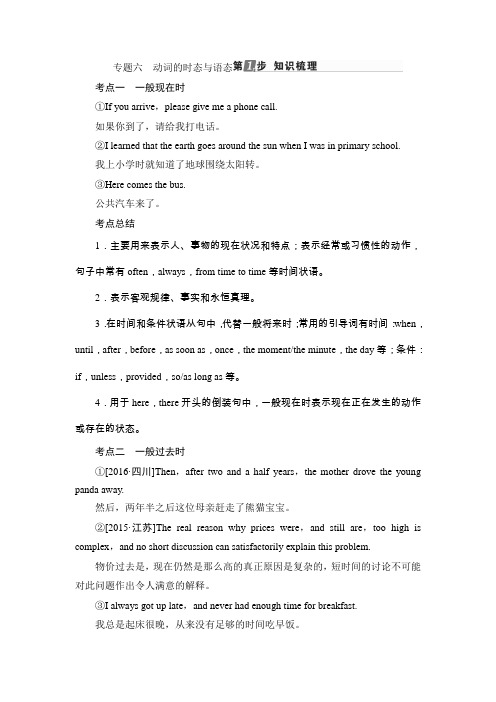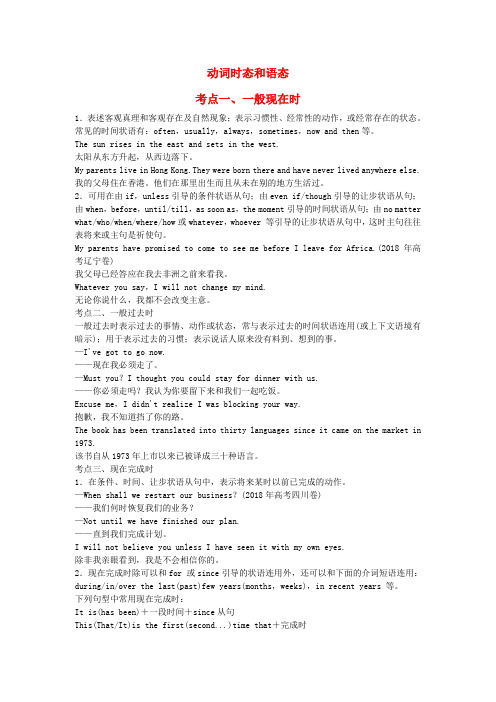2018届高考语法专项 动词的时态和语态
- 格式:doc
- 大小:242.00 KB
- 文档页数:12

2018高考英语动词时态和语态精讲精练在高考英语中,动词的时态和语态是重中之重,试题在考查固定句式中的时态和语态的同时,注重在上下文语境中考查时态和语态。
要了解几种时态的一些常规规则,答题时要研读题干,搜索出尽可能多的“时间参照信息”,尤其要注意一般现在时表示动作的经常性或真理;表示现状、性质、状态时多用系动词或状态动词;在条件、时间、让步状语从句中用一般现在时或现在完成时表示将来;表示预计或规定;方位副词或介词短语放在句首,主语是名词,且全部倒装时,用一般现在时表示正在发生的动作;还可使用于文学作品和文学评论中。
练一练:用所给词的适当形式填空:①I'll go there after I ________(finish) my work.②The water will be further polluted unless some measures ________(take).③My train ________(leave) at 6:30.④A snow ________(expect) to come next week.⑤Here ________(come) the bus.⑥This kind of cloth ________(wash) well.⑦Don't take it away. It ________(belong) to me.⑧He said water________(boil) at 100 ℃.考点2一般过去时和现在完成时一般过去时(标志词:yesterday,just now,last year,the other day等)表示动作发生在过去,和现在毫无关系。
现在完成时(标志词:since,in the past/last years,just,recent(ly),lately,so far=up to now=up until now=by now,already,yet,several/many/...times)则强调的是对现在的影响和结果,动作到现在刚完成或还在继续。



专题六动词的时态与语态考点一一般现在时①If you arrive,please give me a phone call.如果你到了,请给我打电话。
②I learned that the earth goes around the sun when I was in primary school.我上小学时就知道了地球围绕太阳转。
③Here comes the bus.公共汽车来了。
考点总结1.主要用来表示人、事物的现在状况和特点;表示经常或习惯性的动作,句子中常有often,always,from time to time等时间状语。
2.表示客观规律、事实和永恒真理。
3.在时间和条件状语从句中,代替一般将来时;常用的引导词有时间:when,until,after,before,as soon as,once,the moment/the minute,the day等;条件:if,unless,provided,so/as long as等。
4.用于here,there开头的倒装句中,一般现在时表示现在正在发生的动作或存在的状态。
考点二一般过去时①[2016·四川]Then,after two and a half years,the mother drove the young panda away.然后,两年半之后这位母亲赶走了熊猫宝宝。
②[2015·江苏]The real reason why prices were,and still are,too high is complex,and no short discussion can satisfactorily explain this problem.物价过去是,现在仍然是那么高的真正原因是复杂的,短时间的讨论不可能对此问题作出令人满意的解释。
③I always got up late,and never had enough time for breakfast.我总是起床很晚,从来没有足够的时间吃早饭。

2018年高考英语语法--动词时态与语态40题专项复习一、单项填空:1.Albert Einstein was born in 1879.As a child, few people guessed that he a famous scientistwhose theories would change the world.A.has been B.had been C.was going to beD.was2.He must have sensed that I ________ him.He suddenly glanced at me and said quietly,“Why are you staring at me like that?”A.would look at B.looked at C.was looking at D.am looking at3.It is reported that a space station ______ on the moon in years to come.A.will be building B.will be builtC.has been building D.has been built4.Dashan, who_________crosstalk, the Chinese comedic tradition, for decades, wants to mix it upwith the Western stand-up tradition.A.will be learning B.is learningC.had been learning D.has been learning5.I’m tired out.I________ all afternoon and I don’t seem to have finished anything.A.shoppedB.have shoppedC.had shoppedD.have been shopping6.—Mum,you should have taken me to the park this morning.—I had planned to,but I couldn’t afford the time.I ________ a lecture.A.had given B.gave C.was giving D.would give7.I like these English songs and they ________ many times on the radio.A.taught B.have taught C.are taught D.have been taught8.—I guess you can buy such a smart phone for 300 dollars.—I could just two months ago,but the price ________ by 20%.A.went up B.had gone up C.has gone up D.goes up9.In my hometown, there is always a harvest supper for the farmers after all the wheat____ cut.A.will have been B.will be C.was D.has been10.He must have sensed that I ________ him.He suddenly glanced at me and said quietly, "Why areyou staring at me like that?"A.would look at B.looked at C.was looking at D.am looking at11.In the last few years,China ________ great achievements in environmental protection.A.has made B.had made C.was making D.is making12.—Hurry up!Alice and Sue are waiting for you at the school gate.—Oh!I thought they ________ without me.A.went B.are going C.have gone D.had gone13.More expressways in Sichuan soon to promote the local economy.A.are being built B.will be builtC.have been built D.had been built14.Tom is very happy in China during this period because his Chinese ________ every day.A.has improved B.is improvingC.Improved D.is improved15.—Where is Peter?I can’t find him anywhere.—He went to the library after breakfast and ________ his essay there ever since.A.wrote B.had written C.has been writingD.is writing16.—Help me out in the kitchen and I ________ you to a cup of coffee.—Sounds good.A.will treat B.treat C.am treating D.have treated17.I had a strong desire to reach in and play with the toy, but ________ thankfully by the shopwindow.A.am held back B.held back C.hold back D.was held back18.—Is Peter coming?—No, he____ his mind after a phone call at the last minute.A.changes B.changed C.was changing D.had changed19.Despite the previous rounds of talks,no agreement ________ so far by the two sides.A.has been reached B.was reachedC.will reach D.will have reached20.The real reason why prices ____ , and still are, too high is complex, and no short discussion cansatisfactorily explain this problem.A.were B.will be C.have been D.had been21.Silk ______ one of the primary goods traded along the Silk Road by about 100 BC.A. had becomeB. B.was becomingC.has become D.is becoming22.—P eter! Let’s hurry.The boss is coming.—Oh,I was afraid that we ________ her.A.miss B.had missed C.will miss D.have missed23.—The plane is leaving right now,but Jim hasn’t arrived yet.—Well,he said he________here on time.A.came B.would come C.can be D.will be24.—Dr.Jackson is not in his office at the moment.—All right.I ________ him later.A.will call B.have called C.call D.will be calling25.At college, Barack O bama didn’t know that he the first black president of the UnitedStates of America.A.was to become B.becomes C.is to becomeD.became 26.—Good evening.I ________to see Miss Mary.—Oh,good evening.I’m sorry,but she is not in.A.came B.come C.have come D.had come27.Whatever you have found,you should give it back to whomever it ________.A.is belonged to B.is belonging toC.belonged to D.belongs to28.I wasn't able to hide my eagerness when I ________, "What do you wish me to do now?"A.ask B.have asked C.am asking D.asked29.Mary really hard on his book and thinks he’ll have finished it by Friday.A.worked B.has been workingC.had worked D.has worked30.Just an hour ago he was telling me on the phone that he ________ home right after the work.A.comes B.came C.would come D.will come31.—Do you think he can get the first prize for jumping?—Impossible now.He ________ to do so,but he has just hurt his leg.A.would expect B.was expected C.has expected D.is expected32.—I wonder what makes you a successful manager.—I ________ as a waiter for five years,which contributes a lot to my today’s work.A.serve B.have served C.had served D.served33.Now the world’s attention ________ the stock markets,as they have a great influence on theworld’s economy.A.is fixing on B.has fixed onC.is being fixed on D.had been fixed on34.It is the first time that Brazil ________ the right to host the modern Olympics.A.had had B.has C.had D.has had35.In the last few years,China ___ great achievements in environmental protection.A.has made B.had made C.was making D.is making36.Jane can’t attend the meeting at 3 o’clock this afternoon because she ______ a class at tha ttime.A.will teach B.would teach C.has taught D.will be teaching37.Despite the previous rounds of talks, no agreement______ so far by the two sides.A.has been reached B.was reachedC.will reach D.will have reached38.—Tom is so joyful that he smiles at everyone.—So ________ you if you get the first in the exam.A.do B.are C.would D.will39.—Did you enjoy the party?—Yes.We ________ well by our hosts.A.were treated B.would be treatedC.treated D.had treated40.—Dr.Jackson is not in his office at the moment.—All right.I____ him later.A.will call B.have called C.call D will be calling参考答案1.答案为:C2.答案为:C解析:考查时态。

动词时态和语态考点一、一般现在时1.表述客观真理和客观存在及自然现象;表示习惯性、经常性的动作,或经常存在的状态。
常见的时间状语有:often,usually,always,sometimes,now and then等。
The sun rises in the east and sets in the west.太阳从东方升起,从西边落下。
My parents live in Hong Kong.They were born there and have never lived anywhere else. 我的父母住在香港。
他们在那里出生而且从未在别的地方生活过。
2.可用在由if,unless引导的条件状语从句;由even if/though引导的让步状语从句;由when,before,until/till,as soon as,the moment引导的时间状语从句;由no matter what/who/when/where/how或whatever,whoever 等引导的让步状语从句中,这时主句往往表将来或主句是祈使句。
My parents have promised to come to see me before I leave for Africa.(2018年高考辽宁卷)我父母已经答应在我去非洲之前来看我。
Whatever you say,I will not change my mind.无论你说什么,我都不会改变主意。
考点二、一般过去时一般过去时表示过去的事情、动作或状态,常与表示过去的时间状语连用(或上下文语境有暗示);用于表示过去的习惯;表示说话人原来没有料到、想到的事。
—I've got to go now.——现在我必须走了。
—Must you?I thought you could stay for dinner with us.——你必须走吗?我认为你要留下来和我们一起吃饭。
动词的时态和语态2018.01 Ⅰ.单句语法填空1.(2015·北京,22改编)—Did you enjoy the party?—Yes,We__were_treated__(treat) well by our hosts.解析:根据上下文,这里谈的是举行过的一次聚会,应该用过去时,并且“我们”是被主人招待的,所以需用一般过去时的被动语态。
句意:——你喜欢这个聚会吗?——是的,我们的主人很好地招待了我们。
2.(2015·北京,26改编)In the last few years,China__has_made__(make) great achievements in environmental protection.解析:时间状语in/over the last few years通常与现在完成时连用。
句意:在过去的几年中,中国在环境保护方面取得了巨大成就。
3.(2015·北京,30改编)—Dr.Jackson is not in his office at the moment.—All right.I__will_call__(call) him later.解析:据第一句的时态判断,Dr. Jackson目前不在办公室,所以打电话是将来的事。
句意:——Dr. Jackson现在不在办公室。
——好的,我待会再给他打。
4.(2015·天津,6改编)Jane can't attend the meeting at 3 o'clock this afternoon because she__will_be_teaching__(teach) a class at that time.解析:根据题干时间状语3 o'clock this afternoon的提示可知,动作发生时间为将来;而句尾的at that time为一个特定的时间点,因此,该题强调在将来的大时间背景下的某一个特定时间点发生的事,故用将来进行时。
2018全国高考汇编之动词时态与语态一(2018安徽卷)23.The twins, Who their homework, were allowed to play badminton on the playground.A. will finishB. finishC. have finishedD. had finished【考点】观察时态【答案】D【分析】句义:已经达成了他们的家庭作业,这对双胞胎被同意在操场上打羽毛球。
依据句义可知他们达成作业是在被同意到操场上打羽毛球以前。
而他们被同意打羽毛球已经使用了一般过去时,所以达成作业应当使用过去达成时。
故D 正确。
【贯通融会】--- Peter, do you know who____ my dictionary ?---Sorry , I don’t know . I didn’t do it .A. has taken awayB. was taking awayC. had taken awayD. is taking away【答案】A试题剖析:句意:--皮特,你知道谁把我的词典拿走了吗?--对不起,我不知道,我没有拿。
这里拿走发生在过去,重申对此刻造成的影响,不知在什么地方,故用此刻达成时。
二(2018北京卷)22. ---Hi, let’s go skating.--- Sorry, I’m busy right now. I _______ in an application form for a new job.A. fillB. have filledC. am fillingD. will fill【考点】观察时态【答案】C【分析】句意:—喂,我们五溜冰吧!—对不起,我此刻很忙,我正在填写一份新的工作申请表。
依据句意可知本句是在表达说话时正在进行,正在发生的事情,所以使用此刻进行时。
故C正确。
【试题延长】时态题的观察重点是抓住句子的上下文含义和句中的时间状语。
专题07 动词的时态与语态动词的时态、语态和语气是高考中的重中之重,也是英语句子结构的核心。
英语句子的灵动性很大程度上体现在动词的各种变化上,因此谓语动词的时态、语态、语气的运用三位一体,不可分割。
在单项填空题型中,时态和语态是考查的热点,但是语气问题也不可忽视。
在备考过程中应该对谓语动词变化的各种情况都能够了如指掌。
可以预测,未来高考仍然会以考查时态为主,但考查形式会更多地结合语态和语气等形式,越来越侧重在语境中考查动词的时态、语态和语气,所以要求考生首先要掌握时态、语态和语气的基本用法,同时在所设置的语境中根据所给信息进行判断。
也就是说,考生应学会通过上下文来确定所用时态、语态和语气。
热点题型一一般时态例1、The real reason why prices ________,and still are,too high is complex,and no short discussion can satisfactorily explain this problem.A.were B.will beC.have been D.had been答案:A【提分秘籍】1.一般现在时(1)表示经常发生的、习惯性的、反复出现的动作或状态。
常与表示习惯的副词(词组)always,every time,now and then,occasionally,often,seldom,sometimes,usually,every day/night等连用。
(2)按时间表、时刻表、日程表等安排将要发生的动作,用一般现在时。
只限于go,arrive,leave,start,stay,return,begin,come等动词。
(3)用在时间、条件或让步状语从句中,用一般现在时表示将来。
Around two o’clock every night,Sue will start talking in her dream.It somewhat bothers us.每天晚上两点左右,苏就说梦话。
2018届高考语法专项动词的时态和语态一时态1.表示习惯性、经常性发生的动作或存在的状态,常与表示频度的时间状语连用,如usually,often,always,sometimes,every day等。
◆On Monday morning it usually takes me an hour to drive to work.星期一早晨,通常花费我一小时开车去上班。
2.表示客观事实、真理、格言或者警句等。
◆As we all know, the earth travels around the sun.众所周知,地球围绕太阳转。
3.表示按照时间表、计划安排好的或者规定的行为,只限于go, come, leave, start, stop, arrive, begin, return, open, close等表示动作趋向性或移动意义的词。
◆My dream school starts at 8:30 am and ends at 3:30 pm.我理想的学校上午8:30上课,下午3:30放学。
4.在时间、条件等状语从句中常用一般现在时代替一般将来时。
◆If you come this afternoon, we’ll have a meeting.如果你今天下午过来,我们将开个会。
5.在某些以here,there开头的句子中,用一般现在时表示现在发生的动作或存在的状态。
◆Here comes the English teacher.英语老师来了。
[典例] (2015·全国卷Ⅱ语法填空)This cycle ____________(go) day after day:The walls warm up during the day…goes解析:时间状语为day after day,且根据下文的warm用了一般现在时可知此处表示目前的情况,所以用一般现在时。
1.表示过去某一时间所发生的动作或存在的状态,常与表示具体的过去时间状语连用,如yesterday, last month, just now, the other day, three days ago, in 1989等。
◆The other day I came across an old friend on the top of Mount Tai.前几天,我在泰山顶上偶然遇到了一位老朋友。
2.在时间、条件等状语从句中常用一般过去时代替过去将来时。
◆He said he would not attend the meeting any longer if it rained.他说如果下雨他不参加会议了。
3.表达“原以为/本来认为/原希望”等意义时,know, think, expect等动词常用一般过去时。
◆I didn’t expect to meet you here.我没料到会在这里碰见你。
4.常见句型(1)It is time that sb. did sth.“该到……了”。
(2)It is/has been+一段时间+since…did sth.“自从做某事已经一段时间了”。
(3)would/had rather sb. did sth.“宁愿某人做某事”。
◆It is time that we took action to protect our environment.该到我们采取措施保护环境的时候了。
◆It is/has been three years since he joined the army.他参军3年了。
[典例] (2016·全国卷丙语法填空)Confucius believed knives would remind people of killings and ____________(be) too violent for use at the table.were解析:believed后接宾语从句,宾语从句由and连接两个并列谓语,主句用了一般过去时,从句也要用相应的过去时,又因主语是knives,故填were。
1.一般将来时表示将来某一时刻的动作或状态,即单纯的将来事实。
◆He will graduate from Beijing University next year.明年,他将毕业于北京大学。
2.三类表示一般将来时的特殊结构:(1)be going to do sth.表示计划、打算要做某事或者有预兆要发生某事。
◆Look at the cloud. It is going to rain.瞧那乌云,天要下雨了。
(2)be to do sth.表示按计划或安排即将要做某事,或者按照职责、义务、规定等要做某事。
◆We are to obey these rules when we go into the library.当我们去图书馆时,我们要遵守这些规章制度。
(3)be about to do sth.表示即将要发生某事。
该结构通常不与具体的时间状语连用。
◆The train is about to leave.火车即将开出。
[典例] (2015·全国卷Ⅱ书面表达)If you are able to come with us,please let us know and we ____________(wait) for you at the school gate at 9 in the morning.will wait解析:根据if从句用的是一般现在时表示将来,可知主句用will+动词原形表示一般将来时。
1.表示此刻正在进行的动作或存在的状态,常与时间状语now,at the moment, at present 等连用。
◆He is watching a football match on TV at home now.他现在正在家里在电视上看足球赛。
2.一些特定的表示动作趋向性的短暂性动词come, go, leave, get, start, open, arrive, begin, return等常用现在进行时表将来。
◆How many of you are coming to the party next week?你们中有多少人下周要来参加聚会?3.现在进行时态与频率副词always, constantly连用表达某种感情色彩,如不满、厌恶、赞赏等。
◆You are always forgetting the important thing.你总是把重要的事情忘掉。
(表达出不满的情绪)[典例] (2015·北京高考书面表达)I ____________(write) to tell you my exciting plan for the summer holiday.am writing解析:此句是书信的开头语,强调现在正在写信,故用现在进行时。
1.过去某一时刻或某一段时间内正在进行的动作或者存在的状态。
◆He was playing basketball with his friends on the playground at 3:00 p.m. yesterday.昨天下午3点他正在操场与他的朋友们一起打篮球。
2.表示过去一个动作发生时另外一个动作正在进行。
◆She was watching TV when a burglar broke into her house.当盗贼闯入她家时她正在看电视。
3.表示过去按计划、安排将要发生的动作,此用法常见动词有go, begin, leave, arrive, come, return等。
◆I was coming to visit you later that day, but I had to phone and cancel.我本打算那天晚些时候去看你,但是我不得不打电话取消了。
[典例] (2016·北京高考单项填空)Jack ____________(work) in the lab when the power cut occurred.was working解析:句意:杰克正在实验室工作这时停电了。
本题考查“be doing sth. when…”句型。
根据题干中的occurred(一般过去时),可知设空处用过去进行时。
表示将来某个时间正在进行的动作,或按预测将来会发生的事情。
常用的时间状语有:soon, tomorrow, this evening, by this time, in two days, tomorrow evening等。
◆This time next week I’ll be lying on the beach, enjoying the sunshine.下星期这个时候,我正躺在海滩,享受着阳光。
[典例] (江苏高考)—Could I use your car tomorrow morning?—Sure.I____________(write) a report at home.will be writing解析:由题干中的关键信息词tomorrow morning可知,双方在谈论明天早晨的事情,所以答语应用将来进行时,表示“明天早晨我将在家写报告”。
1.表示过去发生或已经完成的某一动作对现在造成的影响或结果,常用的时间状语:already, so far, never, just, before, recently, for a long time, in the past/last few years等。
◆Progress has been so far very good and we are sure that the work will be finished on time.到目前为止,工作进展顺利,我们确信一定会按时完工。
2.表示过去已经开始,一直持续到现在(也许还会继续进行下去)的动作或状态,常与“since+时间点”或“for+时间段”等表示一段时间的状语连用。
◆—I remember you were a talented pianist at college. Can you play the piano for me?——我记得你在大学时是一位极有才华的钢琴师。
你能为我弹钢琴吗?—Sorry, I haven’t played the piano for years.——抱歉,我好多年没有弹钢琴了。
3.现在完成时还可以用在时间和条件状语从句中,表示将来某时完成的动作。
◆Please return the book to me when you have finished it.当你读完这本书请归还给我。